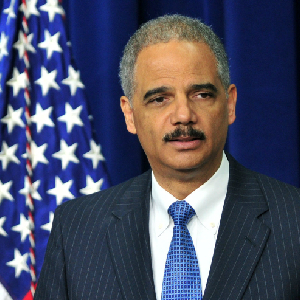
by Ben Bullard
Attorney General Eric Holder, who evidently plans to step down sometime this year, said Tuesday that all States should extend voting rights to felons, ending restrictions he believes are nothing but vestiges of Reconstruction-era racial discrimination against black Americans.
If that happens, it would help round out one of Holder’s stated goals: turning the country’s criminal justice efforts away from punishment and toward social reintegration during his tenure as President Barack Obama’s top law enforcement official.
“[A]lthough well over a century has passed since post-Reconstruction states used these measures to strip African Americans of their most fundamental rights, the impact of felony disenfranchisement on modern communities of color remains both disproportionate and unacceptable,” Holder told an audience at Georgetown University.
“These restrictions are not only unnecessary and unjust — they are also counterproductive. By perpetuating the stigma and isolation imposed on formerly incarcerated individuals, the laws increase the likelihood they will commit future crimes.”
Indeed, the existence of laws does increase the likelihood that criminals of any color will commit crimes. That’s what criminals do; they break laws.
But Holder believes States that revoke voting rights for felons aren’t doing so out of any concern for the rule of law. Rather, he believes they’re simply trying to ensure ex-cons, the majority of whom are black, stay disenfranchised.
“The history of felony disenfranchisement dates to a time when these policies were employed not to improve public safety, but purely as punitive measures intended to stigmatize, shame and shut out a person who had been found guilty of a crime,” he said. “… It is unwise, it is unjust, and it is not in keeping with our democratic values.”
Perhaps it’s time for a national conversation about what the criminal justice system does to quell the promise of realizing the American dream for people who’ve been found guilty of committing a crime.
But even if that were the case, why would anyone listen to a man whose task is to dispassionately enforce the law of the land and not to advocate for or against the laws he’s supposed to enforce?
And more importantly, why would anyone find it sensible to reason with a man who insists on playing the race card nearly every time he opens his mouth to talk about any social issue?
No comments:
Post a Comment